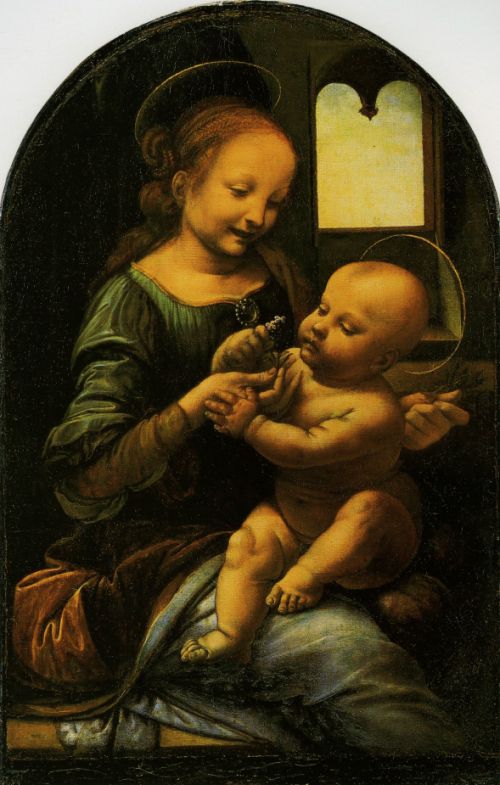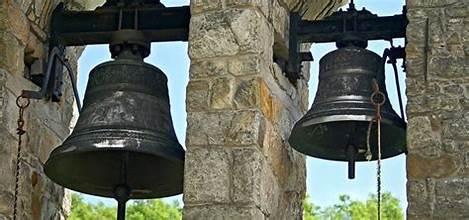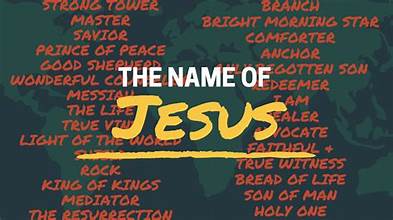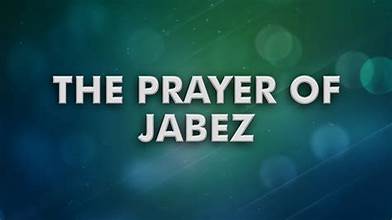Background Passages: Matthew 4:2-11; John 1:1,14; Matthew 22:37-40
The Hermitage in St. Petersburg, Russia, once served as the palatial home of the tsars. The gilded palace is now an art museum. One of the works of art one can see at the Hermitage is The Benois Madonna, painted in 1478 by Leonardo Di Vinci.
Named after the family who once owned it, this portrait of Mary and the infant Jesus have them engrossed in play together, their gazes lifelike to a degree that only Di Vinci could achieve. Above both the Madonna and Jesus hover faint outlines of a halo.
The use of a halo to represent the deity of Jesus is a common theme in art. I remember thinking as I viewed that painting several years ago that Jesus might be embarrassed by the depiction. A halo just wasn’t his style. It’s difficult to see the halo when you read the astounding words in the Gospel of John.
In the beginning was the Word, and the Word was with God, and the Word was God…The word became flesh and made his dwelling among us. (John 1:1, 14)
As steeped in theology as those words might be, I find them so incredibly comforting. Think about that for a second. God’s son who existed in him and with him and was, in fact him, surrendered that divine existence to walk among the weeds with us. The very image of God living the same life I live.
Jesus’ early life is shrouded in mystery that matters only a little bit. From the infant unnaturally born in a natural way, to a 12-year-old with a mind that soaked up scripture like the desert soaks up a raindrop. To the carpenter with calloused hands who emerged from Jordan’s waters to hear his Father kickstart his ministry by declaring, “This is my beloved son in whom I am well pleased.”
Everything else in the years between those brief glimpses into his life remains a product of speculation and imagination. In my mind, he didn’t walk those 30 years with a halo on his head spouting the King James English. He lived those 30 years coming to grips with what it means to live as the image of God.
As he walked away from the Jordan that day, hair dripping with river water, with the words of his father echoing in his heart and soul, Jesus headed into the desert to face the options open to him in his ministry. To more clearly grasp his purpose.
Grady Nutt, in his book Being Me, wrote about Jesus’ time in the wilderness. “This remarkable young man with all his gifts and with his unique relationship to God—he even called God a word we would translate as Daddy—still had to decide who would rule his life and what he would do with his life.”
Scripture tells us that Jesus spent 40 days in prayer and fasting. It’s again speculation on my part, but I think this time spent talking to his father gave Jesus a clear understanding of the role he would play in God’s redemptive plan. Obedience to that plan would put him on a cross. It may not have been the first time the thought entered his mind, but his time in the desert, I believe, left no doubt as to his purpose.
I think the last time he got up from his knees with his stomach rumbling, it was with a sense of clarity and resolve. That’s probably why Satan began to put a bug in his ear, offering a few alternative choices.
You’ll find this account in both Matthew and Luke under a heading of “The Temptations of Christ.” The title gives a little too much credit to the tempter, it seems to me. Nutt calls the same passage, “The Decisions of Christ,” putting the emphasis on the response of the one who is tempted, not the challenge of the tempter.
I like that because when I’m being pulled to consider options other than what I know God demands of me, I have decisions to make. It’s less about the temptation and more about how I will respond to it. What I will decide to do. What choice I chose to make.
The good news is I only need to see Jesus, the image of God standing in a desert, to get a handle on the proper choice to any temptation. Take a look at a familiar story from the Bible.
After fasting forty days and forty nights, he was hungry. The tempter came to him and said, “If you are the Son of God, tell these stones to become bread.”
Jesus answered, “It is written: ‘Man does not live on bread alone, but on every word that comes from the mouth of God.’”
Then, the devil took him to the holy city and had him stand on the highest point of the temple. “If you are the Son of God,” he said, “throw yourself down. For it is written, ‘He will command his angels concerning you, and they will lift you up in their hands, so that you will not strike your foot against a stone.’”
Jesus answered, “It is also written: ‘Do not put the Lord your God to the test.’”
Again, the devil took him to a very high mountain and showed him all the kingdoms of the world and their splendor. “All this I will give you,” he said, “if you will bow down and worship me.”
Jesus said, “Away from me, Satan! For it is written: ‘Worship the Lord your God and serve him only.’” (Matthew 4:2-10)
In Christ, there is certainly the halo effect of God sending his son to become redemption for a sinful humanity. There is also the human effect of God sending his son, as Pastor Ray Stedman says, “to reveal man as God intended man to be.” In all Jesus did, in every aspect of his life as he lived among us as the image of God, we see a man acting as God desired us to act from the very onset of creation. The perfect example of God in human form.
From that perspective, suddenly life makes more sense. Throughout his ministry and certainly in this episode of his life, Jesus calls us to live faithfully by his words, his deeds and his decisions. He even summed it up in two simple statements to a scheming Pharisee.
You shall love the Lord your God with all your heart, and with all your soul and with all your mind. This is the first and greatest commandment. The second is like it. Love your neighbor as yourself. All the Law and the Prophets hang on these two commandments.” (Matthew 22:37-40)
You see how he internalized those commands in his response to the choices in front of him while in the wilderness.
Twice Satan challenged him, “If you are the Son of God, then…” Notice the emphasis on the “if.” It isn’t an “if” in our English sense of the word, as though Satan was trying to make Jesus doubt his relationship to God. God affirmed when Jesus came up out of the Jordan.
Satan himself isn’t confused. He knew exactly who Jesus was.
The Greek text renders the word “if” more closely to our word “since.” “Since you are the Son of God, then”…why not do this instead of what you’ve been told you must do. This will be far less work. Far less pain. Far more glory and power.
What follows the “then” is a decision point where Jesus has to choose to be the one God called him to be. “Since you are the Son of God, then…”turn the stones to bread.” “…throw yourself down…” “…this can all be yours…”
Jesus’ entire life, his entire ministry, would be lived out against the backdrop of these decisions. The devil here is trying to get Jesus to move from the principle of dependence and trust in God. To do things his way.
It is the very essence of temptation for us as well. We face decision point after decision point attempting to get us to act on our own, independently of God and his indwelling spirit. “If you do this, Kirk, then…”
Let’s take a look at the decisions Jesus was asked to make.
You just think you’ve been hungry. Jesus had limited sustenance for almost six weeks. In one of the most understated bits of scripture the Bible tells us “…afterwards he was hungry.” The mere thought of turning a stone to a loaf of fresh baked bread makes me salivate right now. Imagine how Jesus felt when the temptation arose.
As miraculous as the temptation sounds, it rose out of a simple physical need. The temptation came because he was human and hungry, but that’s not really what the devil was saying. The implication is that God left him in the wilderness to starve. That God no longer cared.
That’s the way temptations come to us even today…through subtle suggestions that God could not possibly care for someone like me or you.
It’s the objection we hear to Christianity all the time. How could a loving God allow all this suffering in the world…war, famine, sickness. How could he let a child die? If there is a God, he must not care for us at all.
The devil suggested to Jesus that since God obviously didn’t care and since you are the Son of God, just take matters in your own hands. Meet your own needs independent of God.
It is the same decision you and I must make every day when faced with the choices laid out in front of us. Am I going to trust God or will I do my own thing. Answer my own questions. Make my own way.
Jesus’ response to temptation put life in its proper perspective. “Man shall not live on bread alone.” You see, our deepest need, my deepest need, is not physical. Not now, not ever.
My deepest need is to stay in right relationship with God. To trust. Making decisions based on my own will or by trusting in my own abilities comes at a cost to that relationship. Every single time.
If Satan can’t push you off one cliff, he’ll try to push you off another. After Jesus brushed off his attempt to use his physical needs against him, the devil targeted his soul. The devil couldn’t move Jesus away from this trust in the father, so he opted to put that trust to the test.
Taking Jesus to the highest rampart of the Temple, he said, “Throw yourself off.” Then, he quoted some scripture of his own suggesting that the angels would never let anything bad happen to him…not so much as a stubbed toe.
He said basically, “Do it and everyone will see how much you trust God and how you are willing to put yourself in danger for them. They’ll flock to you. What a spectacle it will be!”
As powerful as his miracles would prove to be, they were not enough to convince many of who he was. His greatest displays of faith came in the quiet trust of his heart that rested on what God had said and revealed to him time and time again. The things he did to stay the course. His trust and obedience to his Father’s will made the difference.
When Jesus spoke again, he chastised the devil. “Do not put the Lord your God to the test.” In other words, you can’t force God to act on your behalf. You can’t force him to change the conditions of life. That’s not the way faith works.
While it may not be as exciting as a swan dive from the top of the Temple, but a life lived obedient to God’s will, in his power and strength, provides the endurance and patience to deal with anything life throws your way…and to do it with joy.
As a last resort, the tempter took Jesus to a high mountain where he could see the world spread out below him in all its glory and beauty. Through subtle pretext and artful disguise, he said, “Worship me and I’ll give you authority over all of this.” The heart of the matter. “You will have power and will be exalted.”
Interestingly, Jesus came to win the world. To be Lord of all. To be exalted above all men so that “every knee would bow” and “every tongue confess that Jesus Christ is Lord…” as it says in Philippians. It was seemingly being handed to him on a silver platter without the agony of the cross. Yet, to grasp the heart of it you have to finish reading the verse. “…to the glory of God.”
That last part is the kicker, isn’t it? It sounds good until you realize the power, authority and the exaltation that come with the devil’s offer is fruitless unless God receives the glory.
Jesus chose again the appropriate response. “Worship the Lord your God and serve him only.”
There lies the basis of our decision to set aside all that glitters and draws us away from God. To keep ourselves from being caught up in the quest for power and glory all our own. The only right decision is to worship and serve the Lord.
It’s such a heart thing to understand, as Stedman says, “To worship is to serve. To serve is to worship.” Only God gives any real value to life. The world can never give it. It is a decision that speaks to the deepest desires of the heart. To have a life that is worthwhile. To worship God only and to serve mankind on his behalf.
So, it seems to me these are the most important decisions I can make in the face of any temptation. Will I trust him? Will I be obedient? Will I worship and serve him? As it was for Jesus, my entire life is lived against the backdrop of these decisions. So is yours.
I’m drawn back to the beginning.
The Word became flesh and made his dwelling among us.
Not with Di Vinci’s halo around his head, but wrapped in humanness to show us how to live as the men and woman God created men and women to be.
Temptations will come, but it’s less about the temptations than it is about the decisions we make when they come. Somewhere out in that desert above the Jordan River, Jesus set a pretty good example for all of us.









